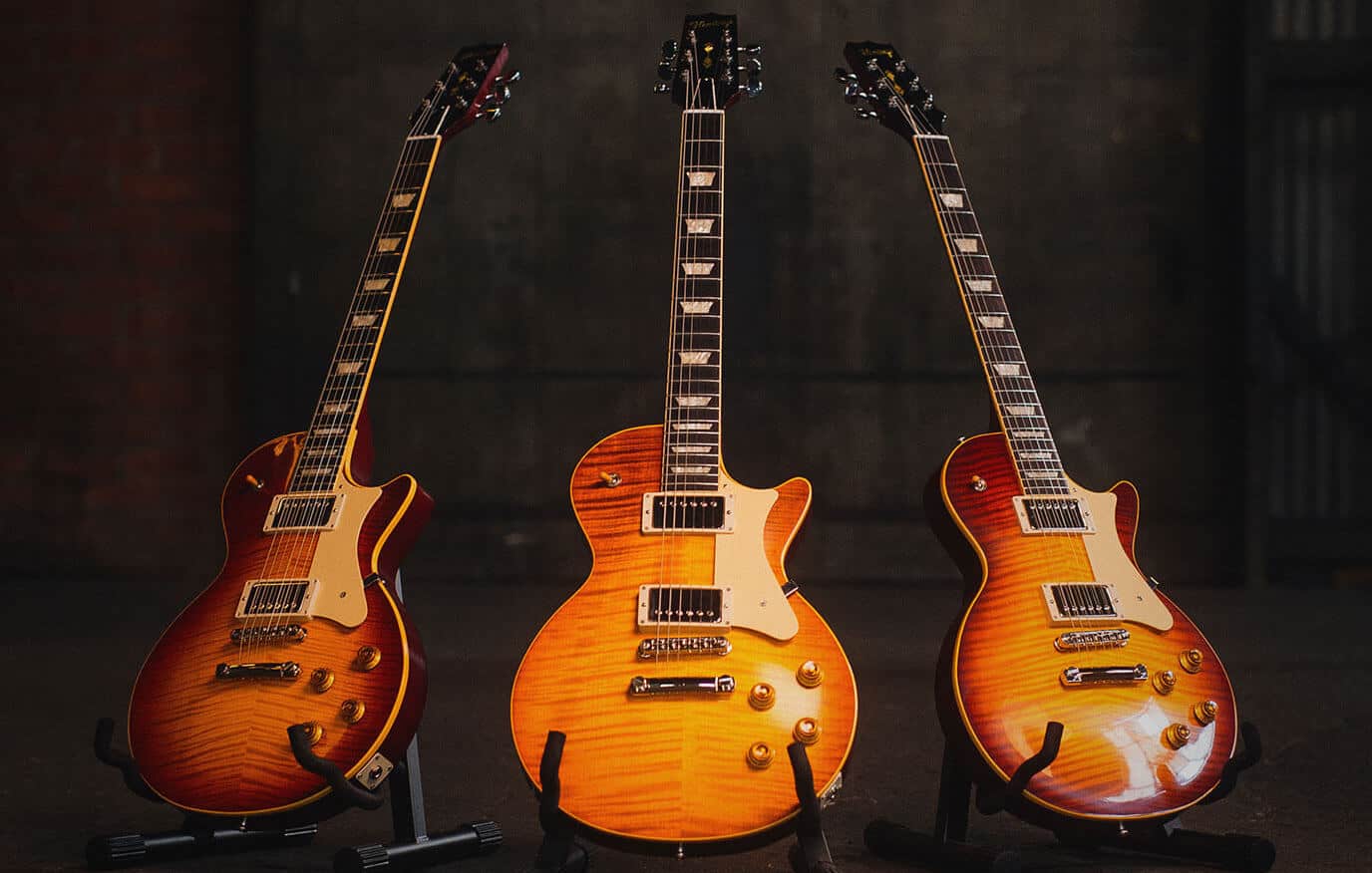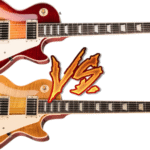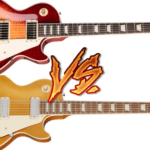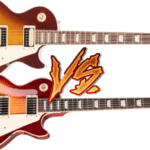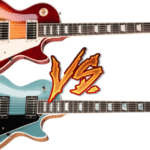Finally, you made the decision. You’re looking for a new Les Paul.
The obvious thing would be just getting a Gibson guitar and calling it a day.
However, upon further research, you might have stumbled upon the Heritage brand of guitars, and if you’re not blind you might have noticed that they look amazing.
Now there’s a very compelling alternative to the original Gibson lineup that you should start considering before making a final decision.
If you just want a short answer about which of these guitars is better, here it is:
The main differences between the Heritage H-150 and the Gibson Les Paul Standard are that the H-150 has a smaller headstock, a one-piece solid mahogany body, and a better overall build quality. The Les Paul Standard has a better resell value and comes in a wider variety of models.
If you are with us for the long run, in this article we will talk about the history of these brands, especially for Heritage, and the main features of these guitars. After that, we will put them side by side and talk about the main differences between them.
Finally, we will give you our insights into which one we think is better for different kinds of players.
Are you ready to get started?
Let’s go!
Heritage H-150 main features
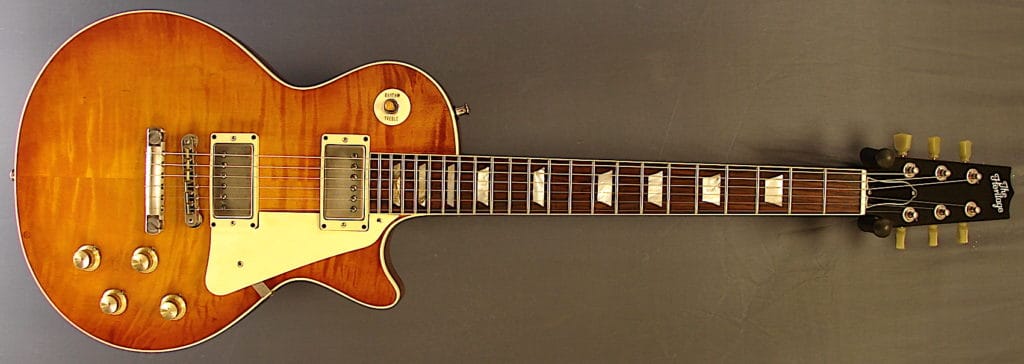
First of all, what is this Heritage brand and where did they come from? Well, actually they came from the insides of Gibson.
In 1985 Heritage guitars was founded by 3 ex Gibson employees in Kalamazoo, Michigan. This was due to the fact that in the early 1980s Gibson decided to relocate its factory to Nashville, Tennessee, and a lot of workers didn’t want to relocate.
A few years later, Heritage started building guitars in some of the same buildings that Gibson left empty.
This new brand focused on models that they knew how to make. Their most popular production items are all based on Gibson designs.
They work at a smaller scale and with a more traditional, artisanal, approach.
The H-150 is Heritage’s Les Paul model. It’s inspired by the glorious late 50s Les Pauls, and it conserves its traditional specs.
H-150s come with Seymour Duncan pickups that match the ‘59s tone, one-piece mahogany bodies, and gorgeous flamed maple tops.
This model is not weight relieved, and incorporates a thinner headstock compared to Gibson’s traditional one. It’s very similar to those of Gibson Melody Makers.
Gibson Les Paul Standard main features
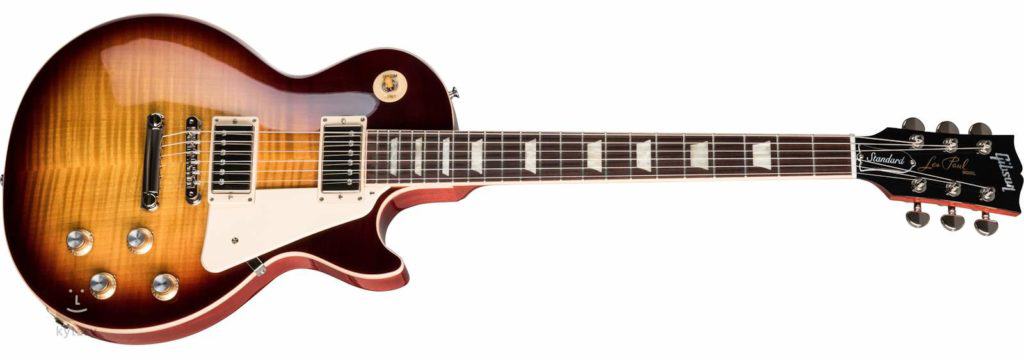
The Les Paul Standard has been a staple forever and there’s not much to say about it that you would not know.
To go into some specifics of the brand’s actuality, they decided to listen to their fans and segmented the Standard lineup by decade.
Now you can find 50s standards and 60s standards. These guitars are not custom shop reissues, but they are built honoring their decade’s most important specs.
These instruments are not weight relieved, and if that’s a problem for you, fear not. They have a Les Paul modern that includes all the quality of life improvements that came with the years and that many players would miss.
A Les Paul Standard is a piece of music history and it’s obvious that many players would gravitate toward them. The quality of Gibson instruments has never been their deal-breaker, but their designs and tones surely are.
Main differences between the Heritage H-150, and the Gibson Les Paul Standard
When comparing the H-150 and the Les Paul Standard side by side you could note slight differences.
The more obvious one is that Heritage’s headstock is slimmer. Some players argue that this design makes for a more straight string pass, and this will help with tuning issues. Other players might not like the aesthetic outcome, or even argue that a less massive head would affect the instrument’s tone.
I don’t think that’s actually something to worry much about.
What I would put in a more frontal perspective is that Gibson has a reputation for delivering different quality instruments within the same line. This might be because of the output volume they have.
Of course, when producing thousands of guitars some details, such as finishes might slip under quality control.
Heritage, being a smaller company is expected and known for keeping its quality standards higher. I think there would be fewer chances of getting a Heritage lemon.
Another notable point is that Heritage uses one-piece mahogany bodies while Gibson, in some cases, goes for 2. This varies between models and years, so don’t take this as written on stone.
Does having a one-piece or a 2 piece body in your guitar matter? Probably not, but hey, many people would argue that the less glue binding your guitar, the better it will resonate.
Finally, another interesting detail is that Gibson guitars would retain their value longer. Many people don’t even know about Heritage, so it’s expected that they would not be as strong in the pre-owned market.
This also means that if you don’t mind buying used, you would probably get a better deal getting a Heritage H-150.
Which one should you choose?
Here in GearAficionado, we don’t like making the choices for you. Getting a new guitar is something very personal and you should make that decision yourself.
Information is everything for this process and that is what we like to bring to the table with our articles.
We always encourage you to try out the gear, if that’s possible for you, before making a choice. Playing the actual guitars you could be buying will surely be a way more informative experience than anything you could read in an article or watch in a YouTube video.
The one-liner here is: Get the guitar that better resonates with your playing and your wallet.
However, if you want to know our insights into which we think would be the better choice for different people, here they are:
- If you need to read “Gibson” in your headstock, go for a Les Paul Standard
- If you want the best price to quality ratio possible, go for an H-150
- If you would like more spec choices and models, go for a Les Paul Standard
- If you prefer one-piece guitar bodies, try out an H-150
- If you want a guitar that will retain its value over time, get a Les Paul Standard
- If you are buying used, look for an H-150

Hello there, my name is Ramiro and I’ve been playing guitar for almost 20 years. I’m obsessed with everything gear-related and I thought it might be worth sharing it. From guitars, pedals, amps, and synths to studio gear and production tips, I hope you find what I post here useful, and I’ll try my best to keep it entertaining also.

